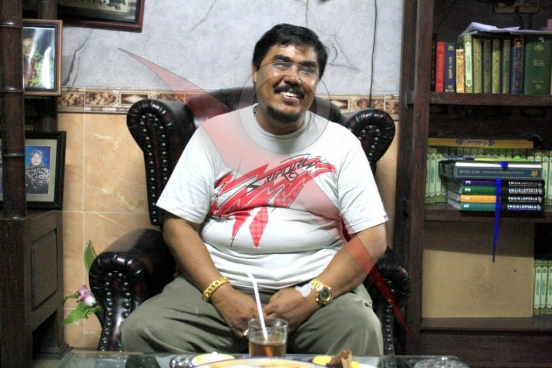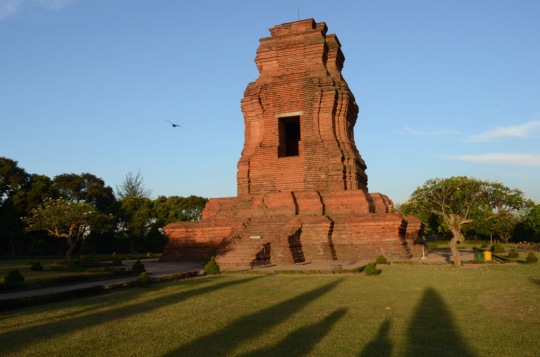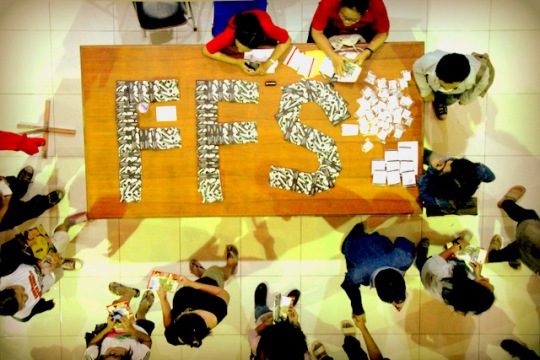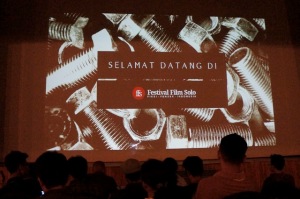![]() Putri Fitria | November 23-24, 2013
Putri Fitria | November 23-24, 2013
—
Local traditions clash with attempts to draw tourists to the site of an ancient Javanese kingdom
When he established Majapahit on November 12, 1293 CE, it might never cross the mind of Nararya Sanggramawijaya, who made himself its first king entitled Kertarajasa Jayawardhana, that the place upon which stood the alleged capital of his glorious kingdom would have to deal with a possible destruction in the face of modern industrial power. But that is the reality of Trowulan, 720 years later.
One of the biggest kingdoms in Southeast Asia’s history that once purportedly conquered almost the whole Indonesian archipelago, Majapahit is said to have come to an end in 1478 CE, a year Javanese people often refer to with the chronogram sirna ilang kerta ning bumi that means the wealth of the earth disappeared, diminished. We have gone a long way since then and years of efforts by various parties to bring the kingdom ‘back to life’ never seemed to succeed. And now the restoration work of the Trowulan site in Mojokerto, East Java, is facing yet another struggle. This time it is against a capital-faced opposition that boasts its power not by building a temple but rather, a steel mill. Continue reading
Putri Fitria | May 14, 2013
When was the last time you saw a good Indonesian film? One that is close and intimate to its viewer? One that is not only entertaining, but also able to arouse certain feelings and to provide food for the mind?
Even though you might have in your head a list of Indonesian films you enjoyed, the number is probably small given how few local productions see the light of day each year.
But Festival Film Solo, a competition for short films held earlier this month in the Central Java city, tried to provide an alternative for enthusiasts. The organizers settled on the short film genre because they strongly believed that shorts are one of the main motors of the Indonesian film industry. Continue reading
Putri Fitria | July 9, 2012
As a child, I was not familiar with the concept of saving in the bank back then, but my mother was wise enough to to teach me the importance of saving some of my pocket money on a daily basis in a piggy bank, which was forbidden to crack open unless I was finally allowed to break it.
Even on Eid al-Fitr, an Islamic holiday mostly famous for the day of toys for most Muslim children in my hometown. I kept my piggy bank handy everywhere. Instead of splurging the money I got from relatives, I would put all of it into the piggy bank, hoping that by the end of the week (Eid al-Fitr is usually celebrated for a week) it would be full and I could afford a new bag or shoes that I had been dreaming of having, with some toys as a bonus.
That’s how I got started into this budgeting, saving, and investing.
So how do mothers nowadays teach their children the knowledge of financial management?
Maybe you could try the following suggestions.
Putri Fitria | May 26, 2012
Arisan is a regular social gathering that is very popular in Indonesia. Almost all people are familiar with this gathering that involves a circle of friends, of families, or even of colleagues. In general, arisan is run once a month. Participants pool together their money, each in a similar amount that has been jointly agreed before. In the meeting a drawing is then carried out to determine a winner or more; each winner gets a defined figure of cash. This goes on until everyone gets his/her winning turn.
Many people believe that while reinforcing relationships among participants, arisan can also be a powerful tool for a short-term financial planning. This is especially for those who just start learning to save.
Some benefits you can draw on from arisans are as follows: Continue reading
Tips on Making Money through Social Networks
Putri Fitria | June 7, 2012
Have you seen Republik Twitter? The Indonesian film that was a hit in early 2012 shows how Twitter maniacs can make money by working as buzzers(a term for online publicists). In fact, there are a range of online jobs that you can rely on as long-term professions, such as social media marketing manager, social media specialist, social media strategist, online community manager, and content specialist.
Many virtual consulting companies have long emerged in developed countries. In Indonesia, however, this field of profession has only been actively operating for three years now. So, how much do people earn? The United States Bureau of Labor states that a social media specialist may make 51,280 USD a year or more that Rp 400 million!
Interested? Get the most out of your networking skills with these following tips: Continue reading
Putri Fitria | May 1, 2011 to June 1, 2012
Vesak, or Waisak is a big day in Buddhism. At the Borobudur Temple, in central Java the Vesak celebrations attract thousands of visitors, most but not all of them Buddhist monks. Often called ‘Buddha’s birthday,’ Vesak actually celebrates the birth, enlightenment (Nirvana), and passing (Parinirvana) of Gautama Buddha. At Waisak night thousands of Buddhists from all over Indonesia gather at the temple’s yard to hold the ceremony of Vesak Day 2556. Aside from the Buddhists, representatives from other religious beliefs also attend this festive occasion.
Putri Fitria | April 27, 2012
Smart women spend smart. And smart spending is smart living.
The smartest thing a woman can do, however, is to save. Whether it is inherent for you to save or not, smart women do save.
Here are 10 tips on how smart women save: Continue reading
Putri Fitria | April 18, 2012
Pulau Pari is one of the islands of the Pulau Seribu archipelago, located a stone’s throw away from Jakarta. Pulau Pari is one of the more quiet islands, which made it my first option for a visit. Although the kapal kayu (a wooden fisherman’s boat) I rode on the way there was full, the amount of tourists on Pari Island seemed sparse compared to other more popular islands of Pulau Seribu.
Putri Fitria & Emma Kwee | March 11, 2012
In metropolitan Jakarta, it seems nothing is more valuable than time. When there is spare time, most Jakartans spend it having a rest, or engaging in typical urban activities. Malls and restaurants seem to be the main source of entertainment (Read our Jakarta Insider Tips to make the most of it!). Feel bored with such routines and do you wish to get away from it all? The Seribu Islands are on Jakarta’s doorstep and provide all the tropical island feel you need to reload and reboot before plunging back into hectic Jakarta.
Pulau Seribu is a group of islands located north of Jakarta, right off Jakarta Bay. The name Seribu (meaning a thousand) does not necessarily mean that there are a thousand islands. In fact, there are only 342 islands, sandy and coral islands either vegetated or not. Like in many other areas in Indonesia, most of Pulau Seribu’s islets are not inhabited. 36 of the 342 islands may be used for recreation. Of these 36 islands, only 13 islands are fully developed: 11 islands are homes to resorts island and two islands are historic parks. Twenty-three islands are privately owned and are not open to the public. The rest of the islands are either uninhabited or support a fishing village. Continue reading
As an old town, Solo has a history of being an epicenter for many cultural interactions, not only between local ethnic groups but also between different countries. By acculturation, the contacts resulted in a new culture. The outcome can be seen in many things; one of them is food.
Mbak Lies’ Selat Solo
Selat solo provides a good example.
This dish is believed to be a European salad adapted to the Javanese tongue. Indeed, it has a European look and a Javanese taste. There are many places to get this food but my favorite is Mbak Lies’. The narrow alley in Kampong Serengan, in which it is situated, does not seem to hide the stall from people’s recognition.
A portion of selat solo contains a variety of vegetables. There are beans, carrots, potatoes, tomatoes, cucumbers, and lettuce leaves. Selat, a localization of ‘salad’, is considered healthy due to the veggies, though it also contains animal products such as beef and boiled eggs. It looks really tempting as it is dished with a pinch of mustard on the edge of the plate. The gravy is brownish and contains raw slices of onions. Continue reading















